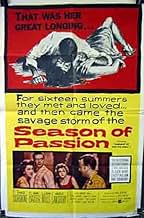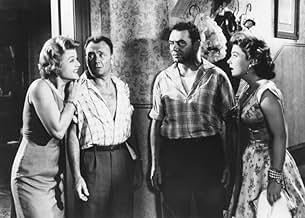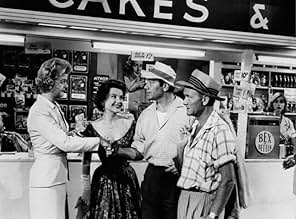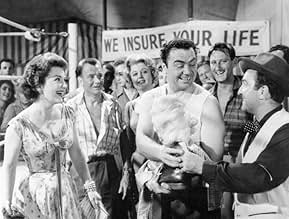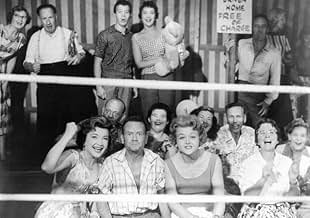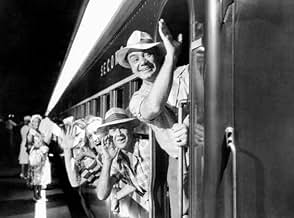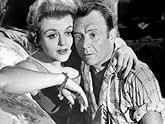IMDb RATING
5.9/10
335
YOUR RATING
Two Australian sugarcane cutters spend their annual five-month vacations in Sydney with their mistresses.Two Australian sugarcane cutters spend their annual five-month vacations in Sydney with their mistresses.Two Australian sugarcane cutters spend their annual five-month vacations in Sydney with their mistresses.
- Director
- Writers
- All cast & crew
- Production, box office & more at IMDbPro
Featured reviews
The single most obvious problem with this film is that you have to go so far down the credits before actually finding an Aussie. The four leads, the old lady, Bubba, even the boxing promoter are all foreign actors. I can vaguely picture a big dumb Yank as played by Mr Borgnine doing some work as a canecutter, but John Mills just doesn't look the part. I have watched him in so many movies and this is probably the first I have ever thought him miscast.
If you are from Sydney there is some great footage of Luna Park in its former glory, the old ferries, Central Station and so on. I believe the play is a mix of humour and drama but there is very little humour in this film. Anne Baxter is probably the best of the four leads, playing a rather desperate sweetheart. Vincent Ball's character is a little too smarmy and one is left wondering why anyone would find him appealing.
It would be very interesting to see a remake with Australian actors in it, although it's doubtful whether the era could be captured as well again. Watch the movie for the locations but don't expect too much from the performances.
If you are from Sydney there is some great footage of Luna Park in its former glory, the old ferries, Central Station and so on. I believe the play is a mix of humour and drama but there is very little humour in this film. Anne Baxter is probably the best of the four leads, playing a rather desperate sweetheart. Vincent Ball's character is a little too smarmy and one is left wondering why anyone would find him appealing.
It would be very interesting to see a remake with Australian actors in it, although it's doubtful whether the era could be captured as well again. Watch the movie for the locations but don't expect too much from the performances.
I Have read the play and seen the film, Ray Lawler wrote the play extremely well. He did something interesting, in writing the play with accents. This is something i haven't seen before.
Leslie Norman however did a poor adaptation of the text version, simple things like getting the city wrong that the play was set in and Australian accents. The accents were bad, the actors did not even seem to try to talk like an Australian. Ernest Borgnine was the main culprit. He had a full blown yank accent happening during the whole film.
This film was a waste of my time, and a waste of everyone else's time who has ever watched it. I does not even deserve a 3 out of 10.
Leslie Norman however did a poor adaptation of the text version, simple things like getting the city wrong that the play was set in and Australian accents. The accents were bad, the actors did not even seem to try to talk like an Australian. Ernest Borgnine was the main culprit. He had a full blown yank accent happening during the whole film.
This film was a waste of my time, and a waste of everyone else's time who has ever watched it. I does not even deserve a 3 out of 10.
Ray Lawler's play about two tempestuous sweetheart couples coping with the layoff season in Sydney, Australia comes to the screen without much humor and a misguided heart. Sugar cane cutters Ernest Borgnine and John Mills take Kewpie doll collector Anne Baxter and manicurist Angela Lansbury to South Australia to rest up and look for holiday work--but trouble brews with Borgnine, who has mysteriously left his job after fifteen years. Practically without plot, this character study has become, on film, a visual journey rather than an emotional or personable one. Paul Beeson's cinematography is certainly striking, even as the entangled relationships and mercurial tempers at the forefront of the story quickly wear themselves out. Forget about accents, these actors (interestingly, if unsuccessfully, cast) don't even look like Aussie natives. Borgnine's strong sense of character and natural way with a complicated chunk of dialogue nearly saves him, but it was a fundamental error to surround these stars with unknown players who really do sound like Australians. The lively section at the amusement park is full of raucous vitriol and Beeson's playful visual composition, but every scene back at the boarding house is a lost cause. A very strange project, indeed. ** from ****
Many years ago I unwisely took part in an amateur production of Thornton Wilder's "The Matchmaker". I can still hear the mayhem created by those of us who tried, and failed miserably, to achieve an American accent and those (including, bizarrely, a stray Welshman) who just gave up and spoke their native idiom. Luckily out home-town audience was very forgiving and the local rag took pity on us.
This dire experience came back to me when I saw "Summer of the Seventeenth Doll", but even so, not having seen the original stage play by Ray Lawler, I didn't realise how badly it had been butchered until I saw a TV performance by the Melbourne Theatre Company. The first reaction of an Australian audience will be to switch off because of the hilarious mangling of their native speech by an all-star cast who deserved better and would have been more gainfully employed on another project. Maybe that wouldn't matter to a foreign audience, but then again, perhaps the resultant strange mixture of assorted Cockney, Bronx and other sounds would have a subtly disturbing effect on any listener.
Of more concern is the fact that the play's essence can't be divorced from its Australian roots, which include deceptively dry, laconic and understated speech cadences, without making it pretty meaningless. In fact it's the very antithesis of the overwrought, borderline- histrionic style of "serious" Hollywood films of the era. Anyone less like a laconic Queensland canecutter than the furiously emoting Ernest Borgnine would be hard to imagine. And switching the location from Melbourne to more photogenic Sydney settings, while trivial in itself, is symptomatic of the filmmakers' imperfect understanding of their vehicle.
I don't know that "Doll" is a great play, but it is a good one. However, given the need for some audience-pulling names there was no real prospect of doing it properly in 1959. The accent problem, which is just part of the underlying cultural mismatch, is not to be dismissed, and I've never heard an American or British actor come close to a convincing Australian accent - even Meryl Streep. Even nowadays, with many high-visibility Australians in Hollywood, it would be a problematic vehicle because at bottom it's pretty stagy. It's just one of those movies that shouldn't have been made.
This dire experience came back to me when I saw "Summer of the Seventeenth Doll", but even so, not having seen the original stage play by Ray Lawler, I didn't realise how badly it had been butchered until I saw a TV performance by the Melbourne Theatre Company. The first reaction of an Australian audience will be to switch off because of the hilarious mangling of their native speech by an all-star cast who deserved better and would have been more gainfully employed on another project. Maybe that wouldn't matter to a foreign audience, but then again, perhaps the resultant strange mixture of assorted Cockney, Bronx and other sounds would have a subtly disturbing effect on any listener.
Of more concern is the fact that the play's essence can't be divorced from its Australian roots, which include deceptively dry, laconic and understated speech cadences, without making it pretty meaningless. In fact it's the very antithesis of the overwrought, borderline- histrionic style of "serious" Hollywood films of the era. Anyone less like a laconic Queensland canecutter than the furiously emoting Ernest Borgnine would be hard to imagine. And switching the location from Melbourne to more photogenic Sydney settings, while trivial in itself, is symptomatic of the filmmakers' imperfect understanding of their vehicle.
I don't know that "Doll" is a great play, but it is a good one. However, given the need for some audience-pulling names there was no real prospect of doing it properly in 1959. The accent problem, which is just part of the underlying cultural mismatch, is not to be dismissed, and I've never heard an American or British actor come close to a convincing Australian accent - even Meryl Streep. Even nowadays, with many high-visibility Australians in Hollywood, it would be a problematic vehicle because at bottom it's pretty stagy. It's just one of those movies that shouldn't have been made.
Ernest Borgnine and John Mills star in this butchering of the Ray Lawlor play about cane cutters in the off - season.
Borgnine, known at the time as the star in "McHale's Navy", is the middle aged labourer (actually about 33 years old or so in the play) past his prime and Mills is his mate.
Angela Lansbury plays herself as a widow replacing Mills' girlfriend. In the play she was more salty than high class.
In the play, "Barney" - played by Mills - was still a fairly young man (still in his mid-ish twenties).
There is an odd scene where Bubba, the young ingenue is a barmaid filling up schooners with dregs (a Scottish bar ?).
Product placements - Peters Icecream (twice), Brylcreem, Toohey Old (twice), TAA (airlines), Tooths (beer) and Bex (twice - aspirin).
Borgnine, known at the time as the star in "McHale's Navy", is the middle aged labourer (actually about 33 years old or so in the play) past his prime and Mills is his mate.
Angela Lansbury plays herself as a widow replacing Mills' girlfriend. In the play she was more salty than high class.
In the play, "Barney" - played by Mills - was still a fairly young man (still in his mid-ish twenties).
There is an odd scene where Bubba, the young ingenue is a barmaid filling up schooners with dregs (a Scottish bar ?).
Product placements - Peters Icecream (twice), Brylcreem, Toohey Old (twice), TAA (airlines), Tooths (beer) and Bex (twice - aspirin).
Did you know
- TriviaAccording to the book "Australian Film & TV Companion" by Tony Harrison, Burt Lancaster, Rita Hayworth, and James Cagney were originally to have starred. Lancaster's company produced the film, but he did not appear in it.
- GoofsAn obvious stunt double is thrown through the ropes at the wrestling match.
- ConnectionsReferenced in Cane Cutter (2008)
- SoundtracksGood King Wenceslas
Music traditional and lyrics by John M. Neale and Thomas Helmore
(uncredited)
Heard as background music
Details
- Release date
- Countries of origin
- Language
- Also known as
- Der Sommer der siebzehnten Puppe
- Filming locations
- Luna Park, North Sydney, New South Wales, Australia(Location for big night-time crowd scene)
- Production company
- See more company credits at IMDbPro
- Runtime
- 1h 33m(93 min)
- Color
Contribute to this page
Suggest an edit or add missing content

